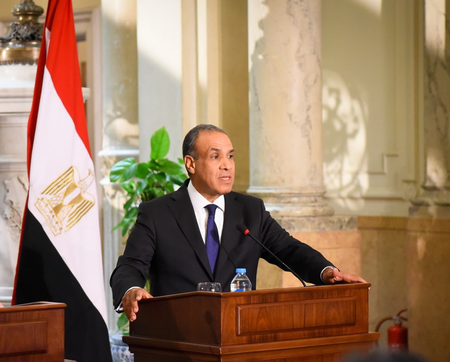
New Delhi — Egyptian Foreign Minister Badr Abdelatty has expressed Egypt’s interest in creating an Indian industrial zone alongside the Suez Canal Economic Zone (SCZONE), highlighting it as a major investment opportunity for Indian companies.
Speaking to journalists in New Delhi, Abdelatty said,
“We have special industrial zones for China and Russia in this region. We are also encouraging the establishment of an Indian industrial zone alongside SCZONE and are providing all kinds of facilitation and incentives to Indian companies. Don’t forget, we have a huge market.”
Abdelatty, on his first visit to India as Foreign Minister, participated in the First India-Egypt Strategic Dialogue with External Affairs Minister S. Jaishankar on Thursday evening. He emphasized Egypt’s push to develop the Suez Canal region, which encompasses multiple industrial and logistical zones, as a prime destination for Indian investment.
“Part of my discussions here is to encourage more Indian companies to invest in Egypt. I met CEOs of six to ten companies yesterday, and I will continue meeting others today. We value Indian investment and the trade volume between our countries,” he added.
Egypt’s market is substantial, with 120 million people (110 million Egyptians and 10 million refugees). Abdelatty noted the country’s FTA agreements with several trade blocs, including the African Continental Free Trade Agreement, the Arab Free Trade Agreement, and the EU Association Agreement, enhancing its appeal as an investment destination.
Strategically located along the Suez Canal — a key maritime route linking Europe, Africa, and Asia — the SCZONE is positioned as a major logistics hub. Abdelatty highlighted that Egyptian President Abdel Fattah El-Sisi has directed the government to provide an enabling environment for Indian companies across traditional sectors like chemicals, pharmaceuticals, minerals, phosphate, and fertilizers, as well as emerging sectors such as digitalization, artificial intelligence, renewable and clean energy.
“Indian companies are very interested in producing green ammonia and green hydrogen. Europe, which is close to Egypt, aims to import 10 million tonnes annually of these products. India has an important role, and we have extended an invitation,” he said.
Abdelatty also stressed Egypt’s strategic location and importance for connectivity projects linking East with West, the Mediterranean with Southeast Asia, and Gulf countries, noting that Egypt is open to participating in projects like the India–Middle East–Europe Economic Corridor (IMEC). He added that regional stability is crucial for the success of such initiatives.
“Egypt is a hub and a strategic location. We are in favor of all connectivity projects, and we can play a key role in their success,” he said.
With inputs from IANS